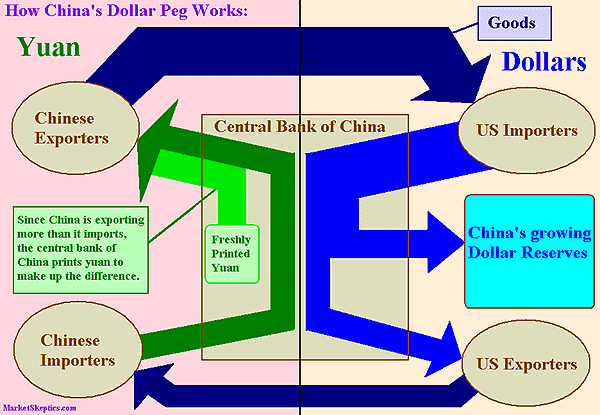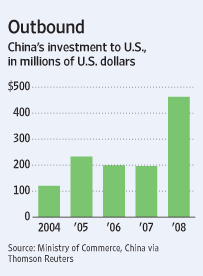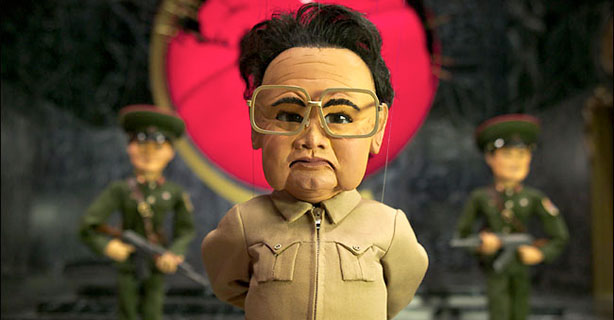Mark Helprin in the WSJ by way of James Riley, plus a couple of NYT pieces on Gates fighting his budget battles with Congress, which, for some reason in this day and age, seems desperate to outspend his wishes.
 Here's a projection from the National Intelligence Council's 2020 look-ahead report. If you go with the high-estimate line (always a safe bet with such a secretive government), then you come up with a number in the same range as Helprin's ($115-120B). By 2025, then, we're looking at a PLA that spends about a quarter-trillion dollars a year.
Here's a projection from the National Intelligence Council's 2020 look-ahead report. If you go with the high-estimate line (always a safe bet with such a secretive government), then you come up with a number in the same range as Helprin's ($115-120B). By 2025, then, we're looking at a PLA that spends about a quarter-trillion dollars a year.
For comparison, check out US spending over the past decade, by way of the Center for Arms Control and Non-Proliferation.

My point here: our baseline spending grew almost as much as China's total budget should be in 2025: $220B. Our top-line budget grew $373B, but you have to consider the war-spending as more subtractive than additive, even as it means our military now has a long recent combat experience base while the PLA really hasn't fought a conflict of any length since the early 1950s, or almost six decades ago.
What are we likely to spend in 2025? Probably in the range of a trillion a year, or still 4X China's total.
Now, if you follow the great projections on China, you would likely have their defense budget catch ours sometime before 2050, but that stuff gets awfully iffy, because it assumes that China will keep up the build-up despite the stunning aging of their population--to wit, in 2050, we'll have a relatively young total population of 400m and China will have 400m-plus over the age of 60.
That's just the background. Now, on to Helprin's scare-mongering piece.
He says we rationalize our growing weakness relative to China's growing strength, telling ourselves that we'll never fight two major adversaries at the same time (our dream of a WWII-redux). Okay, who else are we going to fight at the same time as China? He doesn't say.
Helprin says we delude ourselves by thinking conventional war is a thing of the past, citing "the growth and modernization of large conventional forces throughout the world." That line is just pure bullshit based on nothing.
Here's the SIPRI numbers:

Note two things: 1) It took the world 20 years to get back to the peak spending at the end of the Cold War, and that was across a time period in which wars declined dramatically while numerous great powers rose, a trend that historically results in greater defense spending; and 2) the great growth from the trough of the late 90s to now is about $400B. Well, guess who did most of that additional spending? Duh! The United States. No one is modernizing like we are or racking up huge operational experience at the bleeding edge.
Helprin goes on to say that "appeasement and compromise" isn't turning our enemies into friends. Really? Seems like we just went through a rerun of the start of the Great Depression and what kind of cooperation did we get from all our "enemies" around the world? Actually, pretty damn nice.
Then we get the usual decline-of-the-Roman-empire stuff. Impressive.
So we're told that we've ceded the Western Pacific to the Chinese, meaning, at the very least, we're supposed to hold it ad infinitum. Why? Taiwan could be absorbed by China militarily. And if that happens, "America's alliances in the Pacific will collapse."
Brilliant logic there. China forcibly invades a country it's trying to sign a free trade deal with it and you expect the rest of Asia to suddenly want nothing to do with America. Is this guy high?
From that domination of the Western Pac, China will soon begin to dominate all of Latin America, says Helprin--our China station replaced by China's America station.
Why will China make this supreme effort? I have no idea. China doesn't seem to have any problem buying whatever it wants from Latin America, but apparently the Chinese people will want this more than environmental cleanups or old age pensions. They will go along with any government push to propel China into constant military standoffs with the US on the other side of the Pacific, because Chinese history is so full of such examples.
Me? I see China logically building a naval presence and power-projection capability in the direction of its energy supplies--i.e., the Persian Gulf. I don't see them wasting time and money on regions that are stable suppliers. Of course, if China pushes its way into the Gulf military, pretty soon they'll find themselves involved in all the same Leviathan-SysAdmin work we do there now. And frankly, that would make some sense, given that Asia takes out the bulk of the oil the Gulf provides, while the US can get along without it easily (the PG ranks behind Africa, Latin America, Mexico and Canada, and the US itself as our 5th most important supplier of oil).
And how threatening will a China be that bears this incredible burden? How many costly wars will the Chinese people support in distant lands? Hmm. We shall see.
But this is all silly conjecture on my part. Clearly, the Chinese will do whatever it takes to drive us completely out of the Pacific. Helprin says, we have "perhaps five or ten years" in which we can accomplish a "restoration."
Get used to this logic. Gates is working hard to get the Pentagon and Congress realistic about what we can and cannot afford in the future. We can either pull out of the world and stockpile our brilliant, uber-expensive Leviathan weaponry in anticipation of getting it on with China or we can be more realistic about our Leviathan hedge given our SysAdmin workload. Mr. Helprin believes we can have it all and do it all, and I think that's truly nutty.
But again, the quickest way to bog down the Chinese would be to abandon the Middle East and let them manage it on their own. Any takers on that score?
The Chinese give every indication of wanting to secure their trade networks with the world and no indication of being willing to fight for anything beyond that. Hell, they don't give any indication of wanting even to fight for their trade networks. All they really give as an indication is that they will not tolerate Taiwan declaring independence--their own, whacked-out mania.
We are deep into an age in which our old friends will spend less on their militaries and rising new competitors will spend more on theirs. We can either seek cooperation with these rising powers on mutual economic interests or we can try to hedge against them all, demanding that only America can decide such things.
The fixation with China is convenient for US military hawks, because the Chinese Communist Party will rule in a single-party state, with no serious challengers, for the next two decades or so. Of the other rising great powers, we don't really fear any of them, because they're close enough in their political pluralism--save demographically collapsing Russia--to avoid such suspicions on our part. Now, we can pretend that this crew of rising great powers will prefer a world run predominately by the PLA over one more dominated by the US military, but I think that's a paranoid assumption. I think the alleged Beijing consensus only works so long as China stays out of wars, which is why I'd love to see them sucked into a few.
Mr. Helprin sees a clear and clean route to the top of global military domination for the Chinese. I don't. I see a surfeit of hidden domestic debts and a public with no stomach for military adventure. I also see a single-party state that could not politically survive a single military defeat, and hence it will risk none. China cannot free-ride its way to the top and then dominate with no resulting exposure to draining wars. To believe in such a trajectory is, in my mind, truly ahistoric.
Helprin likewise sees China's defense rise as a pure zero-sum---as in, they gain and we lose. I do not. I see the Chinese arriving just in time.
We will either convince the Chinese to cooperate with us on global security or we will cede the burden to them. Either way, China is going to get dramatically bogged down by all its burgeoning global network connectivity. To believe otherwise is sheer fantasy.
There ain't no such thing as a free lunch. We've never gotten one, and neither will the Chinese.
 Wednesday, June 2, 2010 at 12:07AM
Wednesday, June 2, 2010 at 12:07AM 


































